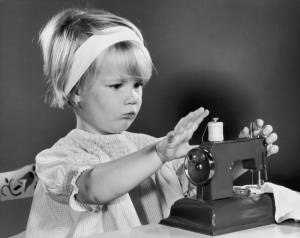*****
Trigger warnings: references (sometimes graphic) to emotional, physical, religious, and sexual abuse.
*****
HA note: The author’s name has been changed to ensure anonymity. “Auriel” is a pseudonym. Auriel blogs at Drying My Wings.
*****
Also in this series: Part One: Growing Kids the Abusive Way | Part Two: Isolation and Ideology | Part Three: Mini-Parents | Part Four: The Sound of a Sewing Machine | Part Five: The Aftermath of Childhood Abuse
*****
Part 4: The Sound of a Sewing Machine
Staring at thread and machinery, she allowed her exhausted shoulders to slump against the hardback chair.
With each repetitive motion, her hands deftly cut cut cut cut cut across the stiff grey table. Tic tic tic tic the machines whir endlessly, in and out, in and out. Rip rip rip rip!
Hours of work are undone by hours more work. Half-completed items lie in growing heaps. Reds, greens, blues, salts and peppers, all become a muddy pile of blah. Daylight dims as the girl strains her neck forward. Red eyes betray stray tears that struggle down her face leaving a salty presence among the rows upon rows of pretty yellow prints.
Her hair falls tiredly across her face. The soft skin of her feet are pricked and pierced by the pins, needles, and scraps that litter the floor. Each calloused finger burns from the glue that cements itself to her fingertips. Of course she longs for freedom. But her owners need not chain her leg to the chair. The girl cannot escape. She has nowhere to go.
The poor child does not even know she is a slave. They have lied to her.
*****
I was trafficked into slavery for forced labor.
Yes, you read that right.
I was trafficked into slavery for forced labor. As a teen, my mother asked if I wanted to do a craft business with her. After the physical, sexual, emotional and spiritual abuse and neglect, obviously it was an offer I couldn’t refuse.
If I had, I knew there’d be hell to pay, and I’d still have to do it.
Boom. I found myself working in a sweatshop 13 hours a day sewing for two months straight, and then for weeks at a time afterwards. I was a literal slave. Mom would not let me do school while I sewed, saying that this was my school (never mind the fact that she called it a business when it suited her).

I spent hundreds of long hours sewing, cutting cloth, embellishing each tiny item with complicated finishes. Furthermore, I was in charge of our website, web store and blog content, and all business records.
To add insult to injury, a person from the newspaper came, interviewed us, and made a story, with me smiling a painted story, telling lies, and gritting my teeth pretending it was fun.
Mom rarely lifted a finger to help me with “our business.” I cried so often. My nerves were shot. Even now, it’s hard to speak of. I wrote in narrative because somehow, that’s easier.
In between, I spent so much time trying to catch up on missed time for school. After hundreds of hours, I was never paid a cent. It broke at least 7 child labor laws in my country. Nevertheless, I was a passionate abolitionist. Through speeches, and human trafficking cases, I poured my soul into the hope that someday slaves would be free, even as I was a slave myself.
I finally escaped with the help of my dad at 16. Somehow, my pleading broke through to him, and he stood up to my mom, telling her it was over.
Even now though, I cannot bear to hear the sound of a sewing machine.
*****
To be continued.

Wow, and the journalist didn’t say anything about the fact that a kid was doing all the work? 😦
LikeLike
Oh my goodness. That’s awful!
LikeLike
Yep. And also, what with growing awareness of human trafficking (i.e. slaves catching seafood or working in Bangladeshi sweatshops, a person could choose a local business in order to walk away from supporting slaves in foreign countries (a practice Obama tried to stop just yesterday by signing a bill completely banning imports to the U.S. made with forced labor) only to walk right into supporting a slave business like the one you were forced to work in, Auriel. ‘Tis a cruel irony, indeed. And websites that track one’s “slave footprint” wouldn’t even have businesses like the ones you were forced to work in listed under the slave category. Hell, even farmer’s markets (which are very likely to be frequented by people interested in making just purchases) could secretly be businesses like the ones you were forced to work in, and nobody would know. Your story should remind people that ending trafficking isn’t as simple as sticking to products with an implication of fair trade or even social justice, as that is exactly the kind of product your mom forced you to make. It will take all sorts of legal measures to end slavery, not just boycotting. And don’t even get me started on what they do in work programs for disabled people either, because that adds to the problem too (disabled people in these programs are often paid far below minimum wage and can be in them for decades sometimes).
Only growing recognition of human dignity and increasing pressure on all forms of slavers (boycotting alone isn’t enough; some people, including escaped abuse victims who might have also been trafficked by their parents, cannot afford to boycott certain products, others can’t due to sensory issues, allergies, and other problems, and slavers may just switch to selling different products once others are boycotted anyway) will stand a chance of ending slavery.
LikeLike